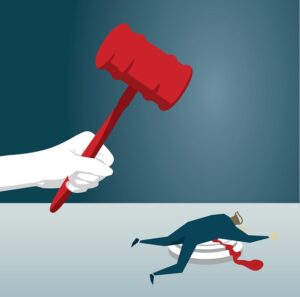
Newsletter Signup
Subscribe and get breaking news, commentary, and opinions on law firms, lawyers, law schools, lawsuits, judges, and more.
We will never sell or share your information without your consent. See our privacy policy.
Category Added in a WPeMatico Campaign

Subscribe and get breaking news, commentary, and opinions on law firms, lawyers, law schools, lawsuits, judges, and more.
We will never sell or share your information without your consent. See our privacy policy.

Subscribe and get breaking news, commentary, and opinions on law firms, lawyers, law schools, lawsuits, judges, and more.
We will never sell or share your information without your consent. See our privacy policy.

Subscribe and get breaking news, commentary, and opinions on law firms, lawyers, law schools, lawsuits, judges, and more.
We will never sell or share your information without your consent. See our privacy policy.
An image where Hadid chose the timing, lighting, wardrobe, and pose… but we’re paying Getty instead. (Photo by Marc Piasecki/WireImage)
The Verge has a write-up on model Gigi Hadid’s current legal battles with the dismissive headline, “Gigi Hadid wants to rewrite copyright law around her Instagram account.” And while that’s technically accurate, it’s not really fair to the underlying argument Hadid and her lawyers are making, which is that America’s intellectual property laws were woefully unsuited to the modern world, and something needs to change fast.
This is a legal regime that supercharges patent and copyright trolls and while every legal observer bemoans the trolling culture, few are willing to stand up and demand concrete legal changes to fix it. Apparently, we need to rely on Gigi Hadid to handle that for us which — no offense to Gigi — should really embarrass every academic, jurist, and legislator.
At issue is an Instagram photo Hadid posted of herself. One would think that posting pictures of yourself is entirely fair game (or fair use as the case may be) because this is basically the language of all online communication these days. But because Hadid is a celebrity instead of your cousin, she got a shakedown request from an agency demanding payment for infringing the copyright, claiming — without much evidence — that it’s now the owner of the copyright of the paparazzo who took the picture.
There’s an argument over whether or not the copyright has been properly registered and whether or not this agency actually has an assignment to pursue this claim, but let’s push all that aside and focus on Hadid’s fair use arguments because that’s the source of the controversy here.
The memorandum of support says Hadid didn’t infringe on any copyright “because Ms. Hadid posed for the camera and thus herself contributed many of the elements that the copyright law seeks to protect.” She, the memorandum states, creative directed the photograph, not the photographer who captured her on the streets of New York City. (The photo has since been deleted from Hadid’s Instagram, but it shows Hadid standing on a street smiling in a denim outfit.)
The media coverage kind of scoffs at that, but isn’t it safe to say that Hadid provided value to the work by posing for it instead of storming past in a blur? That may not be enough to make her the actual “creative director” of the portrait — though one imagines that a professional model can frame a better picture than a guy with a zoom and a lot of free time — but it at least complicates the idea that this “work” is the exclusive creation of the photographer. There’s no real provision for this in the existing copyright regime — though Hadid does cite cases where “posing” could be deemed joint authorship — but a system that allows someone to profit off of a model’s skill without even allowing the model a limited license to share the picture on her social media cannot be the right balance of the equities. The concept that it even might be is a sign of how thoroughly broken this system is right now.
Isn’t there something about fair use that says non-commercial use gets leeway? Absolutely there is! But the agency offers the convoluted argument that Hadid posting the photo to her feed constituted a commercial use even though she sells no ads on her feed because everything a model does is implicitly commercial. But if her mere appearance is indirectly commercial, isn’t the photographer straight up stealing from her when he takes her picture? That doesn’t seem like a thread that the paparazzi would want to pull but it’s one that we should consider when we ponder how intellectual property law should work ideally.
The second factor of fair use grants leeway when the work isn’t particularly creative. From the agency’s opposition memo:
It is not just a mere snapshot of an individual on a street corner taken on a cellphone; the Photograph in this case is a highly creative work, involving a number of creative choices including timing, lighting, angle, composition, and others.
Timing? The photographer didn’t choose when Hadid would be walking by. The only thing that arguably transformed this into a carefully constructed glamor shot was Hadid deciding to stop and pose for it, bringing us full circle to the “creative director” argument above that seemed a little kooky until you started reading more of these arguments, didn’t it?
Concerning Hadid’s assertion that she somehow maintains joint copyright in the Photograph because she noticed the photographer and smiled at the moment the photographer chose to snap the shutter is preposterous. Ms. Hadid is as much a joint copyright holder in the Photograph as the subject of a biography is joint copyright holder to the words used by the author to describe her life.
Actually, these are more like the rights of the subject of a biography being a joint copyright holder with their ghost writer.
Frankly, the best argument that the agency makes is that Instagram will promote “sharing” that will obviate the need for anyone to attain a license to the work, which then robs the photographer of his livelihood. That’s fair, but at a certain point intellectual property law is about promoting progress and if our laws are inflexibly bound to protecting the market for running down Princess Di instead of the market for a free and open exchange of images through a social media platform then we’re basically protecting the whalers at the expense of electricity.
In the end, this case may or may not be a winner for Hadid but she’s making some strong points about the fundamental unfairness of the system that too many lawyers and academics uncritically defend. It’s not unlike that abominable “Tom Brady” decision that threw a wrench on the server test, we’re seeing the creaks in an aging regime that barely functioned when Sonny Bono took a hatchet to it in the 90s. It’s positively not built to deal with the modern advancements.
And when something’s out of step with modernity, the right answer is almost never to pull back the reins and stick with the outmoded system.
(Check out the briefs on the next page…)
Gigi Hadid wants to rewrite copyright law around her Instagram account [The Verge]
 Joe Patrice is a senior editor at Above the Law and co-host of Thinking Like A Lawyer. Feel free to email any tips, questions, or comments. Follow him on Twitter if you’re interested in law, politics, and a healthy dose of college sports news. Joe also serves as a Managing Director at RPN Executive Search.
Joe Patrice is a senior editor at Above the Law and co-host of Thinking Like A Lawyer. Feel free to email any tips, questions, or comments. Follow him on Twitter if you’re interested in law, politics, and a healthy dose of college sports news. Joe also serves as a Managing Director at RPN Executive Search.

It’s now been more than 10 years since the subprime mortgage crisis, so it should come as no surprise that Wall Street is back to their old tricks.
Last Friday, Cerberus Capital Management LP issued $174 million worth of bonds backed by home-equity lines of credit, also commonly known as a HELOC. Simply put, a HELOC is like a credit card backed by your home. They are often structured with floating interest rates, which are usually higher than conventional mortgage rates.
According to Fitch, heading into the subprime mortgage crisis, the market for pooling HELOCs into bonds became a nearly $30 billion market. As was frequently the case during the height of the subprime mortgage crisis, these newly-issued bonds received a triple-A credit rating from four ratings agencies. The problem the last time around was home prices fell and homeowners were stuck owing more than the value of the homes they had tapped into for the HELOC. So the “unthinkable” happened, many of these triple-A rated bonds collapsed, later selling for pennies on the dollar.
Post-crisis, the ratings agencies faced numerous lawsuits from investors claiming inaccurate ratings. They used the First Amendment defense, arguing that a credit rating is an opinion protected as free speech. After more than 10 years of quiet in the HELOC-backed bond market, it appears Wall Street is finally feeling creative enough to start selling ‘crap pools’ again.
Only time will tell how these bonds perform this time around, but with home prices hovering around record highs and historically low interest rates, bankers see a huge opportunity…to increase their year-end bonuses.
Thankfully “it’s different this time.” If it’s not, at least the banks know the American taxpayer is waiting to cover their losses.
Get more Hipster Trader on Twitter @Hipster_Trader

(image via iStock)
If the Democrats controlled the House of Representatives, Donald Trump would be impeached for brazenly taking foreign money in exchange for politically favorable treatment, in violation of the Constitution’s ban on foreign emoluments.
Oh, what, the Democrats actually won in 2018? No, no, no, you must be mistaken. See, when you have such an obviously corrupt person clothed in the powers of the President of the United States, a Democratically controlled Congress would surely act on their only Constitutional method of holding such a president accountable.
Sorry. Snark off. In lieu of exercising their Constitutional duties, some 200 Congressional Democrats have filed a lawsuit over Trump’s disregard of the emoluments clause. The Trump administration has fought that lawsuit at every step. But, the White House just lost its latest challenge. U.S. District Judge Emmet G. Sullivan declined to issue a stay in the case, which the Justice Department had requested. From the Washington Post:
U.S. District Judge Emmet G. Sullivan declined to put the case on hold and to block lawmakers from immediately seeking financial information, interviews and other records from the Trump Organization.
“This case will be poised for resolution within six months; an immediate appeal would hardly materially advance its ultimate termination,” Sullivan wrote in a 12-page ruling rejecting the president’s position…
Justice Department lawyers had asked Sullivan to take the unusual step of signing off on an immediate appeal of his earlier rulings because of the “exceptional circumstances” of the case. “Plaintiffs are now poised to seek civil discovery against the President, including into his personal finances and official actions, which will distract the President from his official duties.”
The argument that the Justice Department keeps trotting out, that President Trump is too busy playing golf and trying to start a shooting war via Twitter to submit to normal discovery regarding his potential crimes, seems not to be working on federal judges.
But Trump keeps obstructing and delaying, hoping to one day get in front of the Supreme Court where he seems to remain confident that his handpicked arbiters will deliver him victory.
There will be no resolution soon. The courts don’t seem inclined to fast track any aspect of this case. My read is that judges, and Supreme Court justices especially, want to allow Trump to keep filling his pockets in the most corrupt fashion, and drag out the proceedings past the 2020 election. After the election, this lawsuit might be moot, after all.
And the Democrats are complicit in this slow-moving corruption as well. Impeachment is the way to hold Donald Trump accountable for corruption. This lawsuit is a way to… inspire some awesome law review articles in a few years.
Democrats’ emoluments lawsuit against President Trump can proceed, federal judge rules [Washington Post]
Elie Mystal is the Executive Editor of Above the Law and a contributor at The Nation. He can be reached @ElieNYC on Twitter, or at elie@abovethelaw.com. He will resist.
(Image via Getty)
We want to prevent bad actors from abusing our policy. We saw repeaters who were concerning to us—more than we expected—in some tiny minority of cases. [The council] has to be cautious of the people who try to strategize about how to get an unfair advantage on our test.
— Lily Knezevich, senior vice president for learning and assessment at the Law School Admission Council (LSAC), commenting on the reinstatement of limits on the number of times people may take the LSAT each year. Beginning in September, pre-law students may only take the LSAT three times in a testing year, which runs from June through May. Under the new rules, would-be law students may take the LSAT up to seven times total. LSAC had previously done away with these limits in 2017 when it increased the numner of LSAT testing dates from four to nine.
 Staci Zaretsky is a senior editor at Above the Law, where she’s worked since 2011. She’d love to hear from you, so please feel free to email her with any tips, questions, comments, or critiques. You can follow her on Twitter or connect with her on LinkedIn.
Staci Zaretsky is a senior editor at Above the Law, where she’s worked since 2011. She’d love to hear from you, so please feel free to email her with any tips, questions, comments, or critiques. You can follow her on Twitter or connect with her on LinkedIn.
Late last week, a criminal defendant in Florida had a rather unexpected outburst just before closing arguments were set to begin in his burglary trial. Dorleans Philidor, 33, apparently defecated in his pants and threw his own excrement at the judge, all the while exclaiming, “It’s protein! It’s good for you!”
This is not the shit that you expect to see go down in court on a regular basis.
No jurors were in the room when Philidor flung his feces at Judge Lisa Walsh, who luckily went untouched by the poop because a bailiff told her to run. Allen Rios, a witness who captured the debacle on his Instagram account, said, “It was intense. The corrections officers and police officers were swarming. Like 60 of them. They told everyone to leave and you couldn’t go back in. It was a hazardous area.”
Click here to see the crazy video clip that was taken by Rios.
The Miami Herald has the details on what happened next:
Walsh was not deterred. As courtroom 2-10 was shut down for cleaning, the judge moved the closing arguments to another courtroom upstairs late Friday morning, according to spokeswoman Eunice Sigler.
Jurors deliberated Friday afternoon for about one hour — then found Philidor not guilty of the crime. He won’t be getting out of jail, however, because he is still facing a separate trial in a grand-theft auto case.
It’s unclear if he will face charges related to the courtroom attack.
Something like this could only happen in Florida.
A burglary suspect threw his own feces at a Miami judge. Then, the jury acquitted him. [Miami Herald]
 Staci Zaretsky is a senior editor at Above the Law, where she’s worked since 2011. She’d love to hear from you, so please feel free to email her with any tips, questions, comments, or critiques. You can follow her on Twitter or connect with her on LinkedIn.
Staci Zaretsky is a senior editor at Above the Law, where she’s worked since 2011. She’d love to hear from you, so please feel free to email her with any tips, questions, comments, or critiques. You can follow her on Twitter or connect with her on LinkedIn.
Baker McKenzie has eliminated 46 staff positions — all in the London office in professional and business roles — and another 33 jobs are still at risk as part of a firm-wide assessment. As reported by American Lawyer, a total of 97 roles were placed under review by the firm. Eighteen employees in those positions resigned, and 46 have been eliminated so far (15 were identified as redundant, while there remain 31 cut altogether). The remaining 33 jobs, which are across the human resources, finance, business development, marketing and communications, and knowledge management departments, are still at risk.
The firm offered the following statement on the cuts:
“The ongoing review in London is part of the firm’s three-year global reorganization of our professional business services functions, which includes the creation of new roles, growth in our service centers and investments in new technologies and new services,” a firm spokesperson said in a statement.
“We are grateful to our people in London and globally for their engagement, professionalism and patience throughout this process to date,” the statement said. “We continue to work with those still in roles at risk and in cases where suitable alternative roles are unavailable will offer an enhanced redundancy package.”
Another big change on the way for the London office is smaller — though potentially nicer — digs:
“Like every law firm, we’ve concluded we can probably do with less space,” a London partner at the firm said. “One option is to refurbish the current building and add another floor on top, but everyone would like to move to a nice shiny office. We’re in a good location but the space is tired, and clients want the wow factor.”
Baker McKenzie is reportedly looking to downsize its office space by 10,00 sq. ft.
 Kathryn Rubino is a Senior Editor at Above the Law, and host of The Jabot podcast. AtL tipsters are the best, so please connect with her. Feel free to email her with any tips, questions, or comments and follow her on Twitter (@Kathryn1).
Kathryn Rubino is a Senior Editor at Above the Law, and host of The Jabot podcast. AtL tipsters are the best, so please connect with her. Feel free to email her with any tips, questions, or comments and follow her on Twitter (@Kathryn1).

In fairness, I had no idea what kind of stock image I was even supposed to be looking for with this story. (Image via Getty)
If this happened on a television courtroom drama, you’d criticize the writers for being overly dramatic.
Aubrey Trail was on trial in Nebraska, charged with first-degree murder for the killing and dismemberment of a 24-year-old victim. During the proceedings, Trail appeared to slash his own throat with an unidentified object.
Trail shouted out: ““Bailey is innocent and I curse you all.” He then fell out of his wheelchair bleeding. Trail was taken to a hospital and, I believe, remains alive.
“Bailey” is Bailey Boswell, who is also charged with murder. Boswell was living with Trail at the time of the crime and prosecutors think that Boswell lured the victim out on a date through the Tinder app, and at the very least contributed to the dismemberment.
So… I’m gonna, like, leave behind the gruesome details and try to think about this like a lawyer. Does a courtroom “exoneration” from a co-defendant, prior to that defendant attempting to kill himself, carry a lot of weight in the prosecutor’s office? Is that the kind of thing that changes one’s theory of the case?
I don’t think so. I mean, the man said “Bailey is innocent,” which doesn’t nearly begin to answer the outstanding questions about Boswell’s culpability. According to the news report, prosecutors have Boswell setting up a Tinder date with the victim. The day of the date was the last day the victim was seen. Boswell was living with Trail. Trail just kind of, sort of admitted to killing her. Prosecutors say they have Trail and Boswell at Home Depot buying… dismemberment tools. And they have Boswell resetting the victim’s phone to factory settings.
I don’t know what Boswell is “innocent” of. Did he not strike the killing blow? I’m glad Trail apparently survived his attempted suicide, because I’m sure prosecutors still have more questions for him.
Nebraska murder suspect slashes his own throat in court [NBC News]
Elie Mystal is the Executive Editor of Above the Law and a contributor at The Nation. He can be reached @ElieNYC on Twitter, or at elie@abovethelaw.com. He will resist.